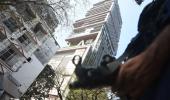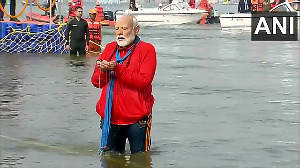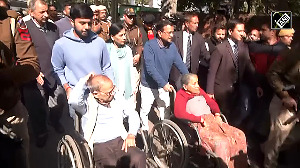The Supreme Court on Monday agreed to hear on June 28, a plea of the Centre challenging the Tripura high court orders on a PIL challenging the grant of security cover to industrialist Mukesh Ambani and his family members in Mumbai.

A vacation bench of Justices Surya Kant and JB Pardiwala was told by Solicitor General Tushar Mehta that the high court has no jurisdiction to entertain the PIL as the state government has nothing to do with the security cover provided to the Ambanis by the Centre on the recommendation of the Maharashtra government.
Mehta said he wants the appeal to be heard urgently as the high court has asked home ministry officials to appear before it on Tuesday with original records concerning the threat perception to the Ambanis, and stated no more adjournment will be granted.
The Tripura high court had on a PIL filed by one Bikash Saha had passed two interim orders on May 31 and June 21 and had directed the Central government to place the original file maintained by the Ministry of Home Affairs regarding threat perception and assessment report of Ambani, his wife and children based on which security has been granted to them.
The Centre said that vide the said orders, the high court has also directed the Central government to depute a responsible officer to appear before the court with the original record, in a sealed cover, on the next date of hearing on June 28, 2022, for consideration of the Court.
“It is respectfully submitted that the aforesaid order has been passed by the high court in a PIL filed by an individual person who had no locus in the matter and was just a meddlesome interloper, claiming himself to be a social activist and student by profession…”, it said.
The government said that in the thoroughly “misconceived, frivolous and motivated” PIL petition, where no violation of any fundamental right was even pleaded, the high court has sought to exercise its judicial review jurisdiction over a decision, which has been taken by trained experts on public order, individual and national security.
“Thus, in the respectful submission of the petitioner, the very indulgence of the high court to judicially review the decision of the Central Government to provide security cover to some of the respondents suffers from patent and manifest errors of law and is perverse requiring interference of this court”, it said.
“It was further pointed out to the high xourt that, based on the threat report obtained by the security forces, ‘Z+' category security was given to Respondent No.2 (Mukesh Ambani) in 2013 and ‘Y+' category CRPF cover was given to Respondent No.3 (Neeta Ambani) in 2016. It was also pointed out to the high court that both the security covers to Respondents 2 & 3 were given on the basis of inputs and assessment reports received from intelligence and investigation units and the expense for giving such security was also duly borne out by the said two Respondents”, it said.
The government added that it was further pointed out to the high court that, Respondents 4 to 6 (Akash Mukesh Ambani, Anant Mukesh Ambani, and Isha Mukesh Ambani) were not granted any central security cover and as such the writ petition qua them was frivolous.
The government said that while entertaining the PIL petition the high court had failed to appreciate that Mukesh Ambani and his families were neither residents of Tripura nor any part of the cause of action remotely arising from Tripura existed.
“Thus, the high court had no territorial jurisdiction or subject matter jurisdiction over the matter. It is further submitted that the Respondents 2-6 (Mukesh Ambani, his wife, and children), admittedly are residents of Mumbai, and the place where the decision-making process of whether to provide them with security or not was taken, inter-alia, is in New Delhi. Therefore, the territorial jurisdiction of the state of Tripura was completely alien to the subject matter of petition”, it said.
The government said that despite the same the high court has directed the production of the original file regarding the threat perception and assessment report of the said Respondents for access when it had no territorial jurisdiction or any legal basis to make such an order.
“Therefore, the interim orders passed by the high court are completely without jurisdiction and unsustainable in the eyes of law and thus liable to be set aside”, it said, adding that during the hearing of the PIL, it was duly pointed out to the high court on behalf of the Central Government that a similar PIL petition, with identical prayers, earlier filed before the Bombay high court was dismissed and the order was confirmed by this top court.
“As such, the prayers made in the subject writ petition were already adjudicated upon not only by the high court but also this Court and, therefore, the subject matter issue being no more res-integra, the subject PIL was liable to be dismissed”, it said.
The government said that it is well settled that the PIL jurisdiction is not equivalent to ‘inquisitive jurisdiction' and this Court in umpteen number of cases has held that PIL can only be entertained if there is a cause of action and the matter relates to a larger public interest.
“Thus, merely because of a hunch or curiosity, either of the Court or of the PIL petitioner, it was impermissible in law for the high court to exercise its Article 226 jurisdiction by entertaining a PIL”, it said.











 © 2025
© 2025